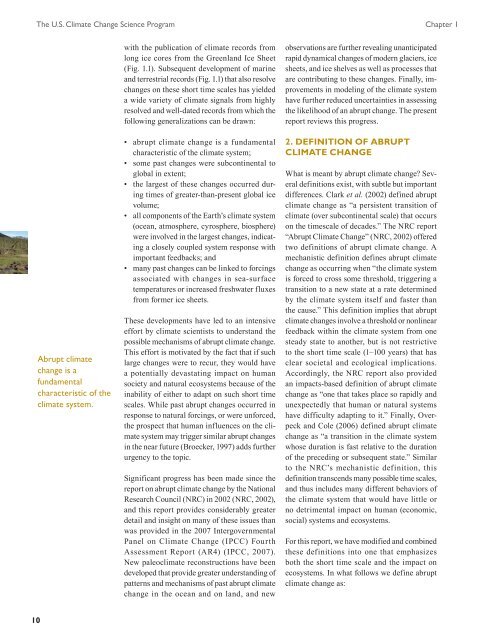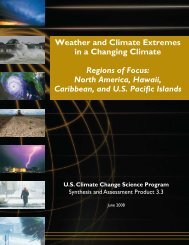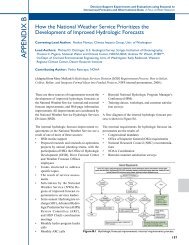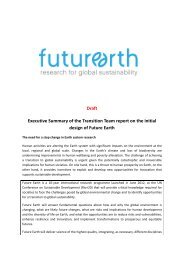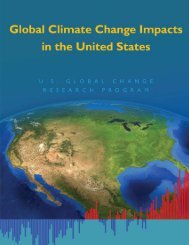Book 2.indb - US Climate Change Science Program
Book 2.indb - US Climate Change Science Program
Book 2.indb - US Climate Change Science Program
- No tags were found...
Create successful ePaper yourself
Turn your PDF publications into a flip-book with our unique Google optimized e-Paper software.
The U.S. <strong>Climate</strong> <strong>Change</strong> <strong>Science</strong> <strong>Program</strong> Chapter 1Abrupt climatechange is afundamentalcharacteristic of theclimate system.with the publication of climate records fromlong ice cores from the Greenland Ice Sheet(Fig. 1.1). Subsequent development of marineand terrestrial records (Fig. 1.1) that also resolvechanges on these short time scales has yieldeda wide variety of climate signals from highlyresolved and well-dated records from which thefollowing generalizations can be drawn:• abrupt climate change is a fundamentalcharacteristic of the climate system;• some past changes were subcontinental toglobal in extent;• the largest of these changes occurred duringtimes of greater-than-present global icevolume;• all components of the Earth’s climate system(ocean, atmosphere, cyrosphere, biosphere)were involved in the largest changes, indicatinga closely coupled system response withimportant feedbacks; and• many past changes can be linked to forcingsassociated with changes in sea-surfacetemperatures or increased freshwater fluxesfrom former ice sheets.These developments have led to an intensiveeffort by climate scientists to understand thepossible mechanisms of abrupt climate change.This effort is motivated by the fact that if suchlarge changes were to recur, they would havea potentially devastating impact on humansociety and natural ecosystems because of theinability of either to adapt on such short timescales. While past abrupt changes occurred inresponse to natural forcings, or were unforced,the prospect that human influences on the climatesystem may trigger similar abrupt changesin the near future (Broecker, 1997) adds furtherurgency to the topic.Significant progress has been made since thereport on abrupt climate change by the NationalResearch Council (NRC) in 2002 (NRC, 2002),and this report provides considerably greaterdetail and insight on many of these issues thanwas provided in the 2007 IntergovernmentalPanel on <strong>Climate</strong> <strong>Change</strong> (IPCC) FourthAssessment Report (AR4) (IPCC, 2007).New paleoclimate reconstructions have beendeveloped that provide greater understanding ofpatterns and mechanisms of past abrupt climatechange in the ocean and on land, and newobservations are further revealing unanticipatedrapid dynamical changes of modern glaciers, icesheets, and ice shelves as well as processes thatare contributing to these changes. Finally, improvementsin modeling of the climate systemhave further reduced uncertainties in assessingthe likelihood of an abrupt change. The presentreport reviews this progress.2. Definition of Abrupt<strong>Climate</strong> <strong>Change</strong>What is meant by abrupt climate change? Severaldefinitions exist, with subtle but importantdifferences. Clark et al. (2002) defined abruptclimate change as “a persistent transition ofclimate (over subcontinental scale) that occurson the timescale of decades.” The NRC report“Abrupt <strong>Climate</strong> <strong>Change</strong>” (NRC, 2002) offeredtwo definitions of abrupt climate change. Amechanistic definition defines abrupt climatechange as occurring when “the climate systemis forced to cross some threshold, triggering atransition to a new state at a rate determinedby the climate system itself and faster thanthe cause.” This definition implies that abruptclimate changes involve a threshold or nonlinearfeedback within the climate system from onesteady state to another, but is not restrictiveto the short time scale (1–100 years) that hasclear societal and ecological implications.Accordingly, the NRC report also providedan impacts-based definition of abrupt climatechange as “one that takes place so rapidly andunexpectedly that human or natural systemshave difficulty adapting to it.” Finally, Overpeckand Cole (2006) defined abrupt climatechange as “a transition in the climate systemwhose duration is fast relative to the durationof the preceding or subsequent state.” Similarto the NRC’s mechanistic definition, thisdefinition transcends many possible time scales,and thus includes many different behaviors ofthe climate system that would have little orno detrimental impact on human (economic,social) systems and ecosystems.For this report, we have modified and combinedthese definitions into one that emphasizesboth the short time scale and the impact onecosystems. In what follows we define abruptclimate change as:10


